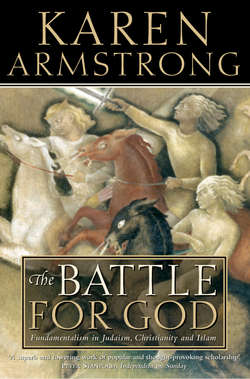Читать книгу The Battle for God: Fundamentalism in Judaism, Christianity and Islam - Karen Armstrong - Страница 10
4. Jews and Muslims Modernize (1700–1870)
ОглавлениеIF MODERNIZATION was difficult for the Christians of Europe and America, it was even more problematic for Jews and Muslims. Muslims experienced modernity as an alien, invasive force, inextricably associated with colonization and foreign domination. They would have to adapt to a civilization whose watchword was independence, while themselves suffering political subjugation. The modern ethos was markedly hostile toward Judaism. For all their talk of toleration, Enlightenment thinkers still regarded Jews with contempt. François-Marie Voltaire (1694–1778) had called them “a totally ignorant nation,” in his Dictionnaire philosophique (1756); they combined “contemptible miserliness and the most revolting superstition with a violent hatred of all the nations which have tolerated them.” Baron d’Holbach (1723–89), one of the first avowed atheists of Europe, had called Jews “the enemies of the human race.”1 Kant and Hegel both saw Judaism as a servile, degraded faith, utterly opposed to the rational,2 while Karl Marx, himself of Jewish descent, argued that the Jews were responsible for capitalism, which, in his view, was the source of all the world’s ills.3 Jews would, therefore, have to adapt to modernity in an atmosphere of hatred.
In America, the developments of the eighteenth and nineteenth centuries had split Protestant Christians into two opposing camps. There had been a similar conflict within Eastern European Jewry at the same time. The Jews of Poland, Galicia, Belorussia, and Lithuania were divided into opposing parties, which would both play a crucial role in the formation of Jewish fundamentalism. The Hasidim, who were not unlike the New Lights, made their appearance at exactly the same time as the American Calvinists were experiencing the First Great Awakening. In 1735, a poor Jewish tavern-keeper called Israel ben Eliezer (1700–60) announced that he had received a revelation that made him a “Master of the Name” (baal shem), one of the faith healers and exorcists who roamed through the villages and rural districts of Poland working miracles of healing in the name of God. But Israel soon acquired a special reputation, because he tended to the spiritual as well as to the physical needs of the poor, so he became known as the “Besht,” an acronym of the title Baal Shem Tov, literally “the Master of the Good Name,” a Master of exceptional status. This was a dark time for Polish Jewry. People had still not fully recovered from the Shabbatean scandal, and Jewish communities, which had suffered grave economic problems ever since the massacres of 1648, were now in spiritual crisis. In their struggle for survival, wealthier Jews did not distribute the tax burdens fairly, the social gap between rich and poor widened, strongmen, habitués of the nobles’ courts, seized control of the kehilla
